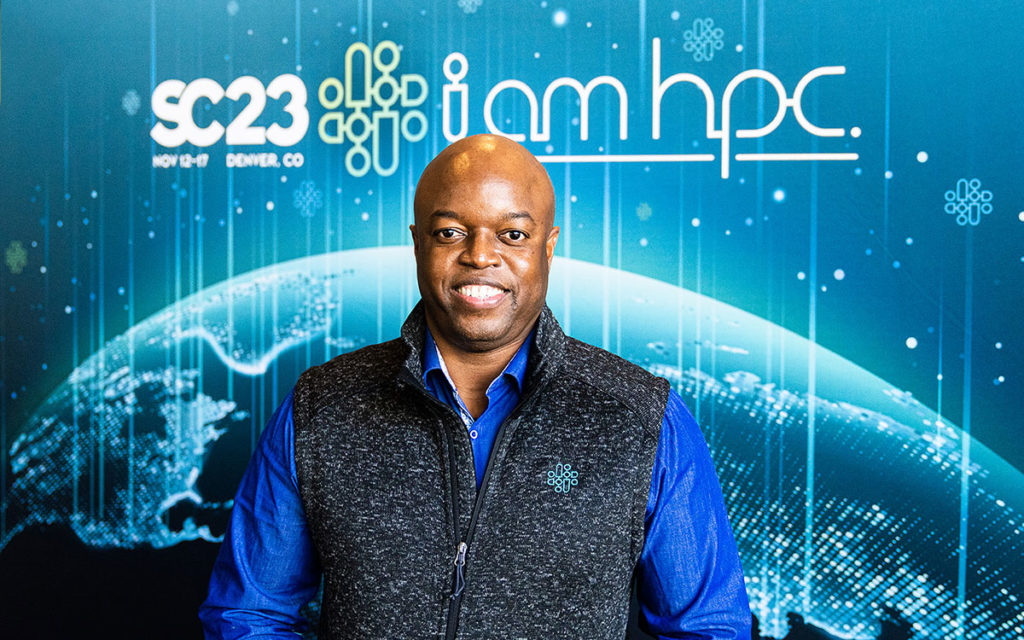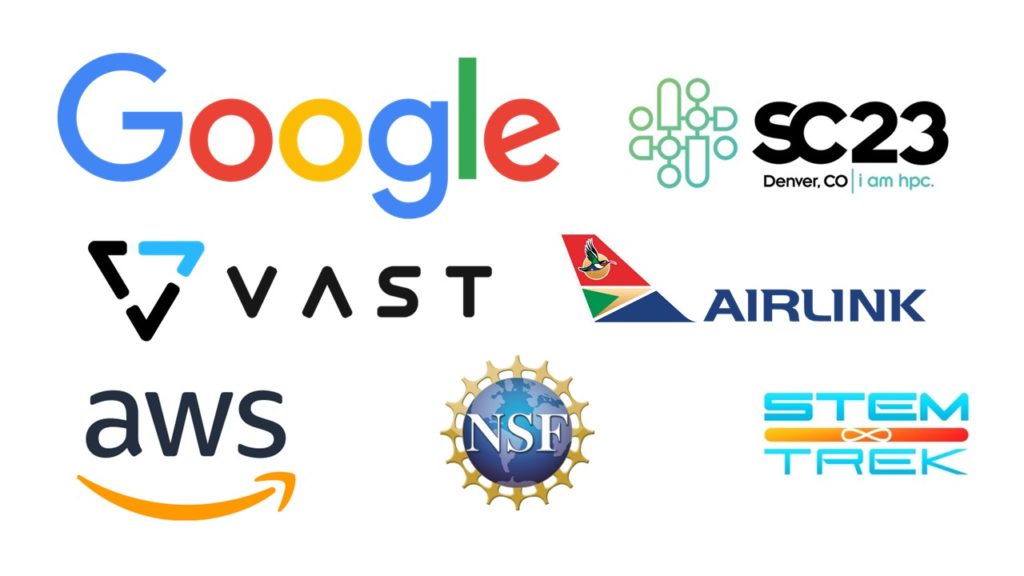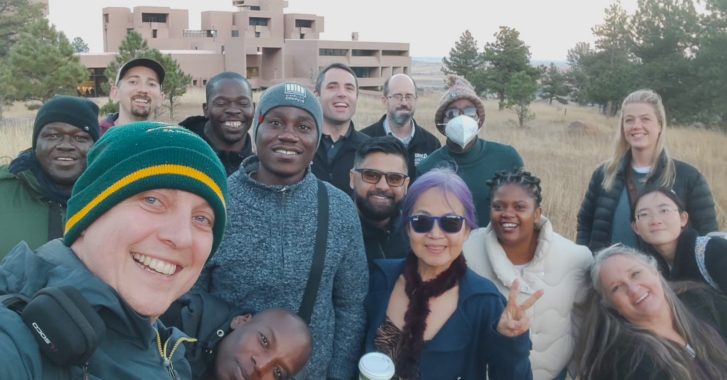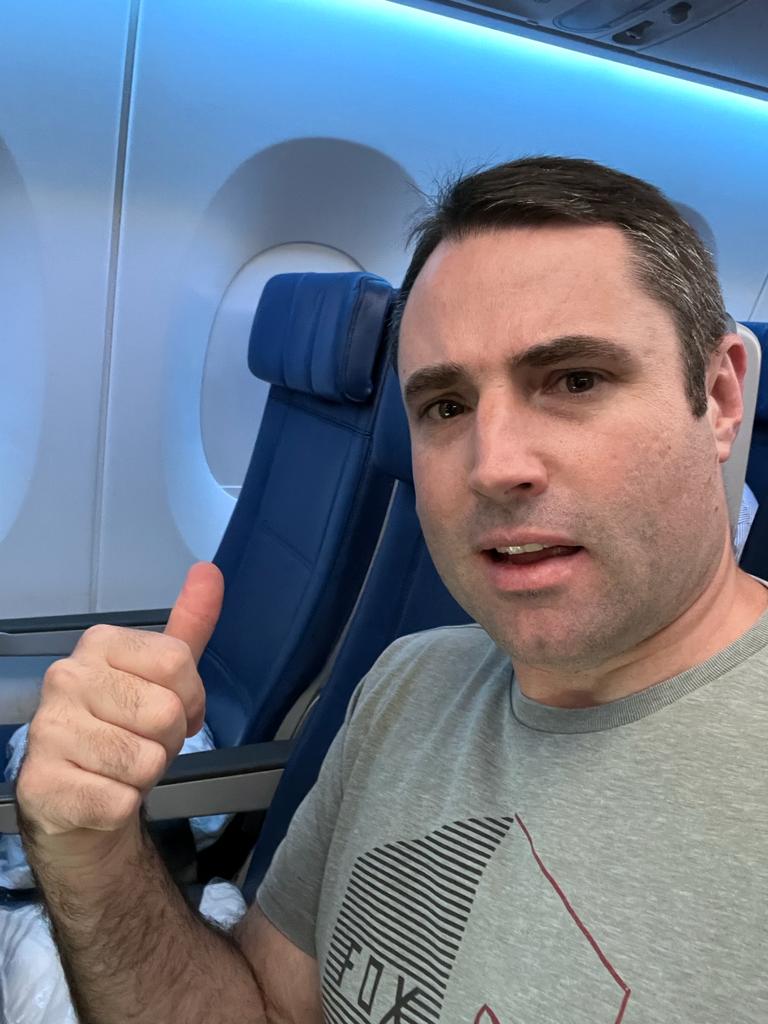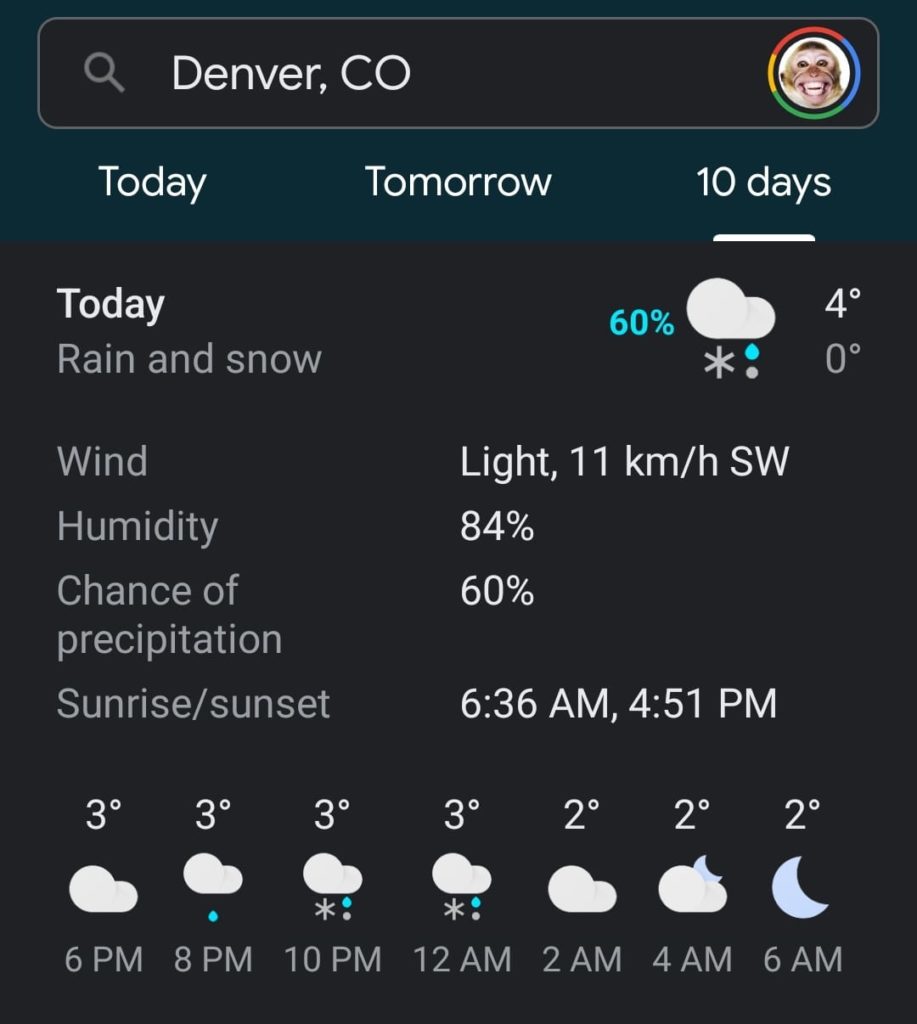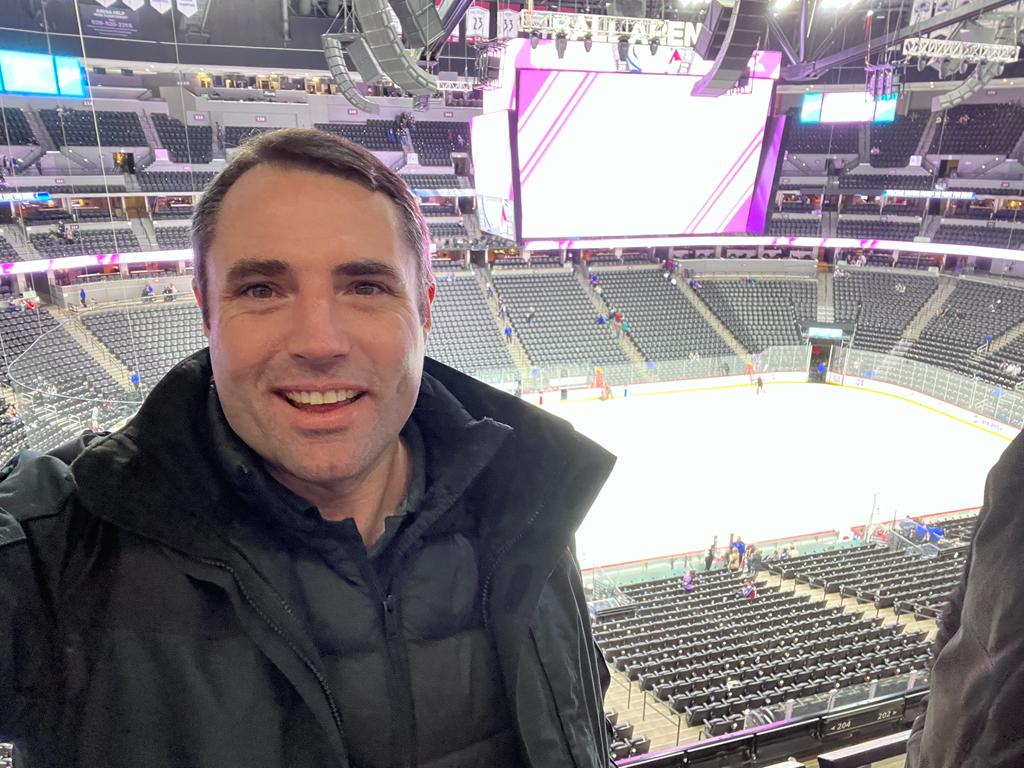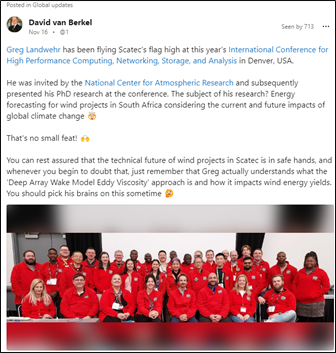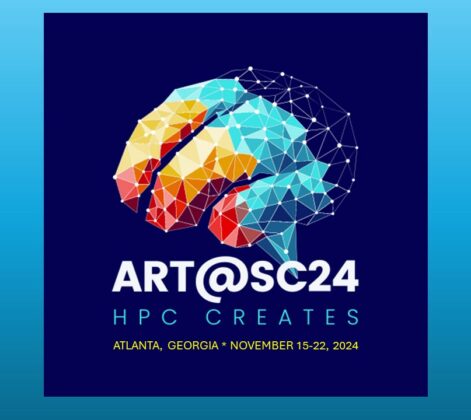By: Greg Landwehr, Principal Engineer, Scatec; PhD Candidate at the University of the Witwatersrand Global Change Institute, South Africa
Following is a summary of the incredible opportunity I had to participate in the STEM-Trek NRG@SC23 Workshop ahead of the Supercomputing Conference in Denver, Colorado recently. With this blog, I have tried to provide you with a first-hand account of this extremely memorable experience. Enjoy!
29th August 2023:
I was thrilled to receive an email from STEM-Trek’s Elizabeth Leake saying “I’m delighted to let you know that you have been selected to receive a travel grant; your award letter is attached.” What an amazing opportunity to participate in NRG@SC23 and share stories of how the renewables industry is collaborating with and urgently needing support from the high-performance computing (HPC) community.
24th October 2023:
From then on it was all systems go to organize the flights, accommodation, and logistics to attend NRG@SC23. Subsequently, I was honored when Elizabeth invited me to present my research on the first day. This allowed me to develop and streamline my final PhD presentation while firming up some of the computational numbers needed for my final PhD paper. Not to mention a great chance to delve deeper into the HPC world and make the connections necessary between the renewable energy industry and supercomputing.
3rd November 2023:
On receiving the final email from Elizabeth with housekeeping details needed for NRG@SC23, the excitement started to mount, and I began getting everything ready for the following week.
7th November 2023:
After boarding the plane in Johannesburg, it was clear that the flight for the long-haul was quite empty. Once the doors closed, I was alone in my row and excited about getting some sleep on the 17-hour flight to Atlanta. Unfortunately, after about 20 minutes, a lady tapped me on the shoulder to inform me that she had been sitting in the wrong seat to begin with and was now going to sit in my row. Needless to say, I was a bit disappointed but, in the end, the flight to Denver went off without a hitch.
8th November 2023:
After 24 hours of travelling, I was relieved to arrive safely at Denver International Airport and go through passport control. After calling an Uber, I realized that the temperature outside was in stark contrast to that of Cape Town. I was glad to get to my hotel and check-in to a warm room where I could start the process of recovering from jetlag and elevation in the mile-high city (Cape Town is only 42 meters above sea level).
9th November 2023
Around 11am, the NRG pan-African delegation met in the foyer of the hotel and headed out to the National Center for Atmospheric Research in Boulder, Colorado, about 30 minutes north of town. What a great experience to hear from dynamic researchers doing amazing work within the realm of Atmospheric Science.
Highlights:
Wenfu Tang’s presentation on the UCAR (University Corporation for Atmospheric Research) Africa Initiative, Ceulin He – UCAR’s land and water use modelling capabilities, Forest Lacey – air quality forecasting, Roelof Bruintjes – early warning systems in Africa and Zhe Zang – food production and groundwater issues as they relate to climate change. These topics were enthralling, and well aligned with my long-term climate research. I was glad to network with such world-renowned experts.
Finally, there was an interesting presentation on the development of an opensource measurement apparatus by Aqbeli Ameko. After discussing the topic afterwards, I was interested in when it would be feasible to add an anemometer to the instrument with Aqbeli clarifying that this is in the pipeline. What a great experience to visit NCAR – an absolute highlight of my trip and one I will never forget.
A key, unexpected highlight of this trip to NCAR, which directly impacts my research, was interacting with Senzo Mpungose from my University, the University of the Witwatersrand. Surprisingly, I was not even aware that Senzo’s group has the capacity to support my research and improve the speed with which we produce long-term energy outputs. We had to travel halfway around the world to make that connection!
On return to the hotel after a long afternoon at NCAR, we were privileged to attend a local Ice Hockey game at Denver’s Ball Arena. We experienced the Colorado Avalanche in action but, unfortunately, they lost the match to the disdain of local fans.
10th Nov – Day 1 of NRG@SC23
The first day of NRG@SC23 began with an introduction by Elizabeth Leake which provided the context for the workshop followed by interesting presentations by fellow colleagues.
Notably, the FBI’s (US Federal Bureau of Investigation) presentation was very interesting for an international delegate, in particular. It shed light on cyber careers in law enforcement, in addition to physical safety while visiting Denver.
Alex Scammon provided an overview of his work at at G-Research; he showcased several of their projects in the energy realm. Judith Vidal did a great job of explaining her thermal storage project at NREL (National Renewable Energy Laboratory in Colorado).
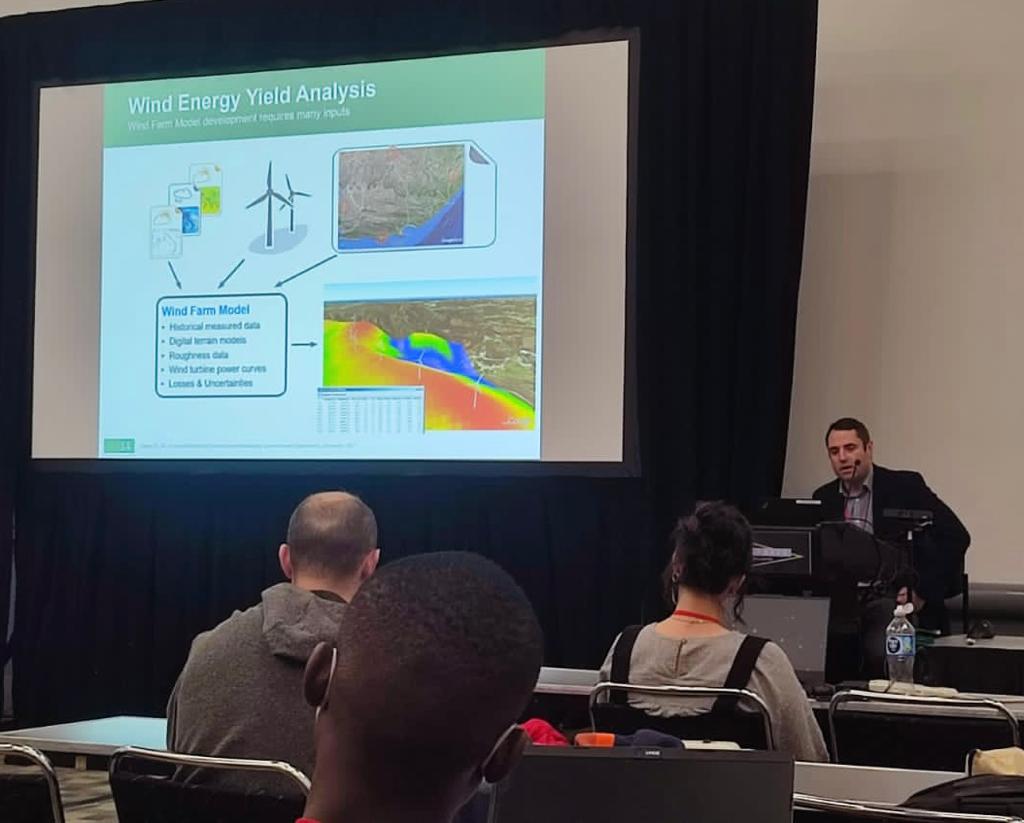
I delivered a presentation about the long-term climate futures of wind energy and a methodology for how to roll this out, globally, from within the Wits GCI.
From the outset, however, it was clear that we needed to be aware of a big blue bear! But, in the long run, it became a good meeting place for the team during lunch and coffee outings into the town.
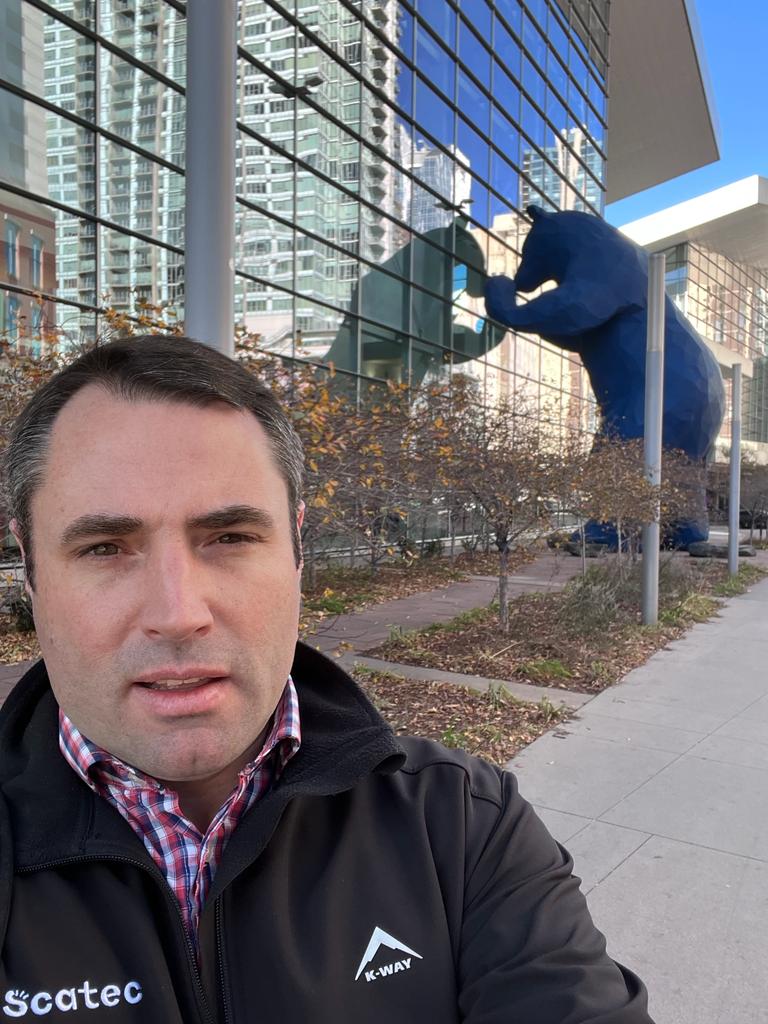
The evening mixer at the Yard House restaurant, sponsored by AWS (THANK YOU!!), was a wonderful treat with great food and company. We all got to know each other a bit better in this informal setting.
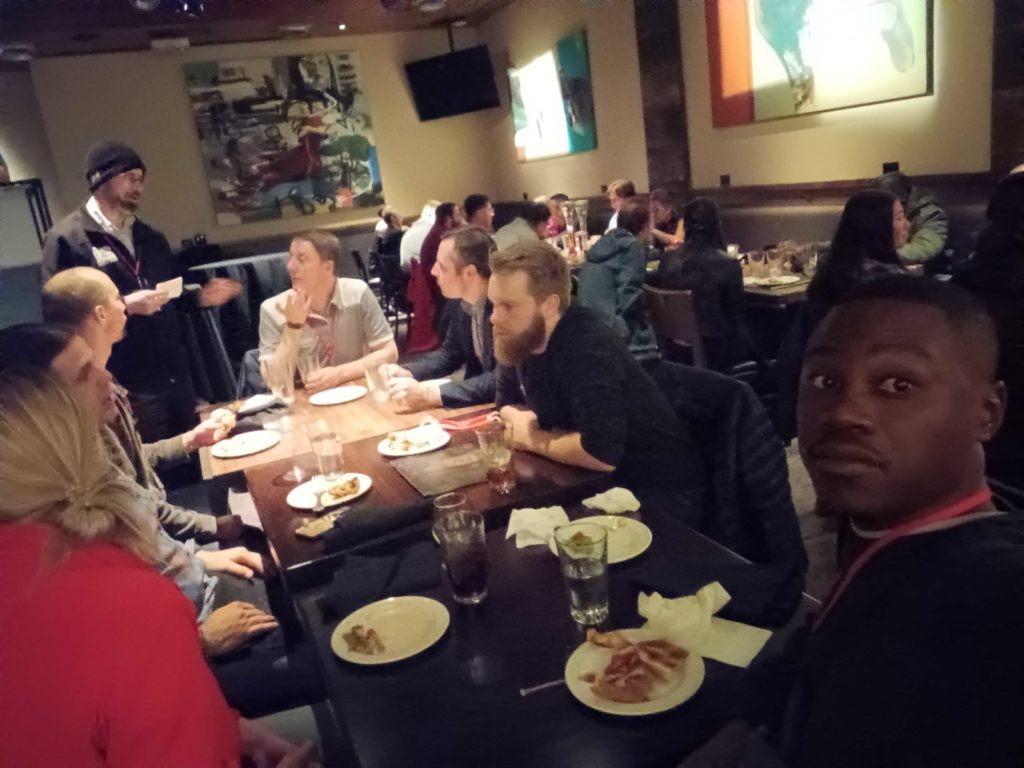
11th November – Day 2 NRG@SC23
Although we couldn’t attend the Veterans Day parade due to overlapping schedules, it was inspiring to learn how well US veterans are celebrated and how their service is acknowledged by the community.
This was a day filled with a wealth of knowledge dissemination. First up, the PAIN panel, chaired by Senzo Mpungose from my University, provided insight into unexpected events that hijack tech organizations’ time and budgets, plus novel strategies that directors have used to navigate such obstacles.
After a wonderful lunch sponsored by VAST Data (THANK YOU!!), we heard about the wide range of solutions that VAST offers.
Shelley Knuth of U-Colorado and US National Science Foundation/NSF-OCI and ACCESS, delivered an interesting overview of NSF-funded cyberinfrastructure resources available to the US research community and how to obtain “credits;” also relevant for my research and search for the right resources to support future work with US collaborators.
The afternoon was rounded off by captivating talks from Honggao Liu (Texas A&M; ACES), Vasilka Chergarova (AmLight), Umesh Upadhyaya (HPC Nepal), and Daniel Howard (NCAR) on their varied approaches and involvement with HPC communities.
Carlie Oakenshield (SW Oklahoma State University) led a closing panel that showcased a range of workforce development initiatives, including those that repurpose decommissioned HPC systems.
Finally, Elizabeth closed the workshop with an insightful end note positioning the work done by STEM-Trek and linking it to various participants and their input. She also provided insights into what is to come through the various collaborations she has developed over the years with a view towards SC24!

12 November 2023 – Workshops SC23
Following the wonderfully orchestrated NRG workshop, we headed straight into the SC23 conference schedule with a staggering amount of content. It’s a good thing that much is available online through the end of the year because there was no way to participate in all of the sessions I wanted to attend.
In the Research Software Engineers in HPC (RSE-HPC-2023) workshop, I enjoyed the presentation by the International RSE Collaboration with the Institute of Computing for Climate Science and the Virtual Earth System Research Institute. Each presented on climate modelling of disruptive elements affecting climate change, once again aligned with my research, in particular forecasting of high impact weather events.
In the 1st Workshop on Enabling Predictive Science with Optimization and Uncertainty Quantification in HPC, I enjoyed the presentation on short term variable renewable energy forecasting i.e. Efficient Probabilistic Tuning of Ensemble Forecasting Method. Ensemble forecasting using machine learning pattern recognition of atmospheric states is aligned with my research. It is essential to forecast (the day ahead) energy from variable renewable energy plants to improve system operator load forecasting.
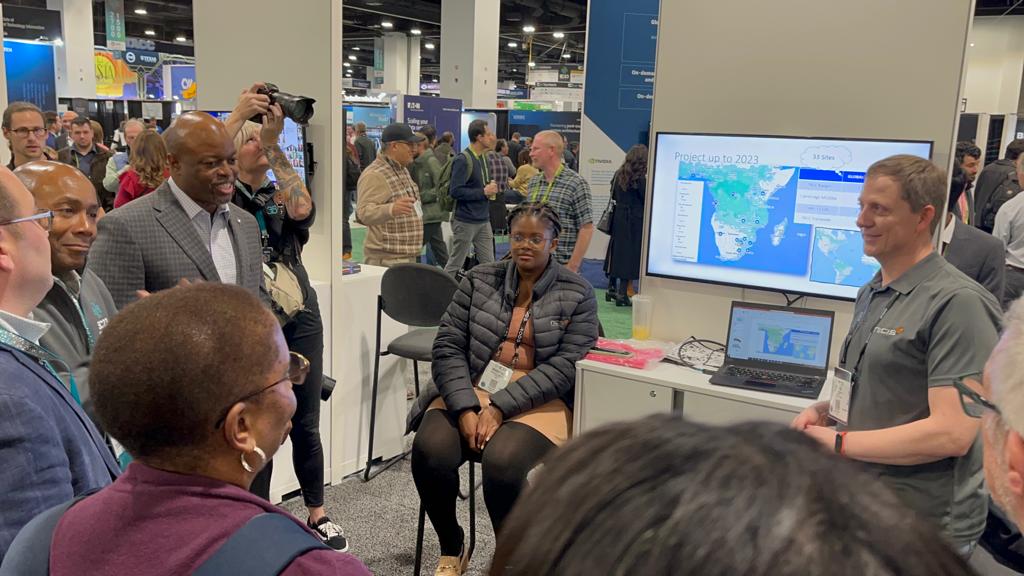
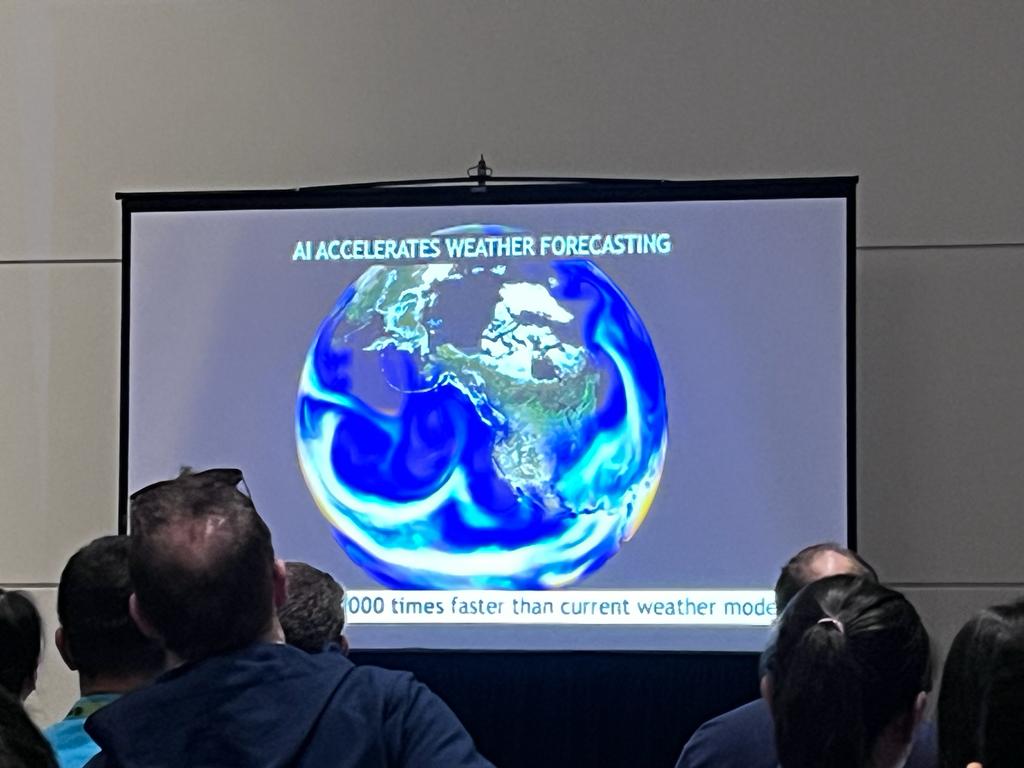
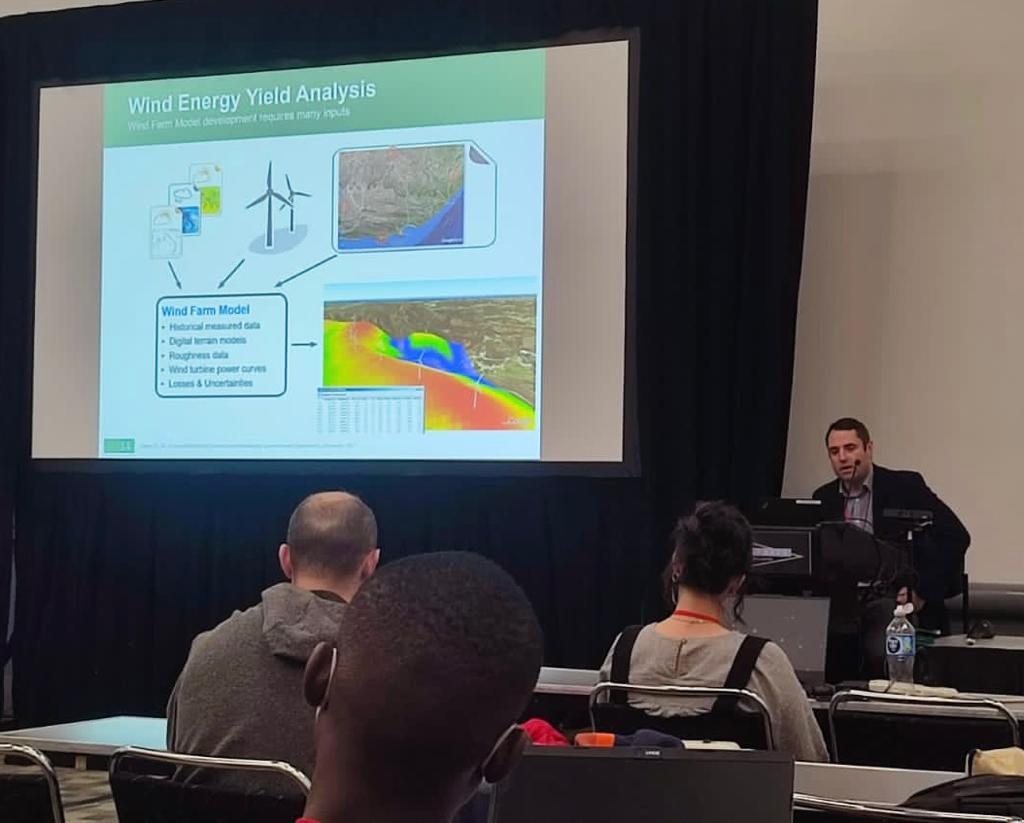
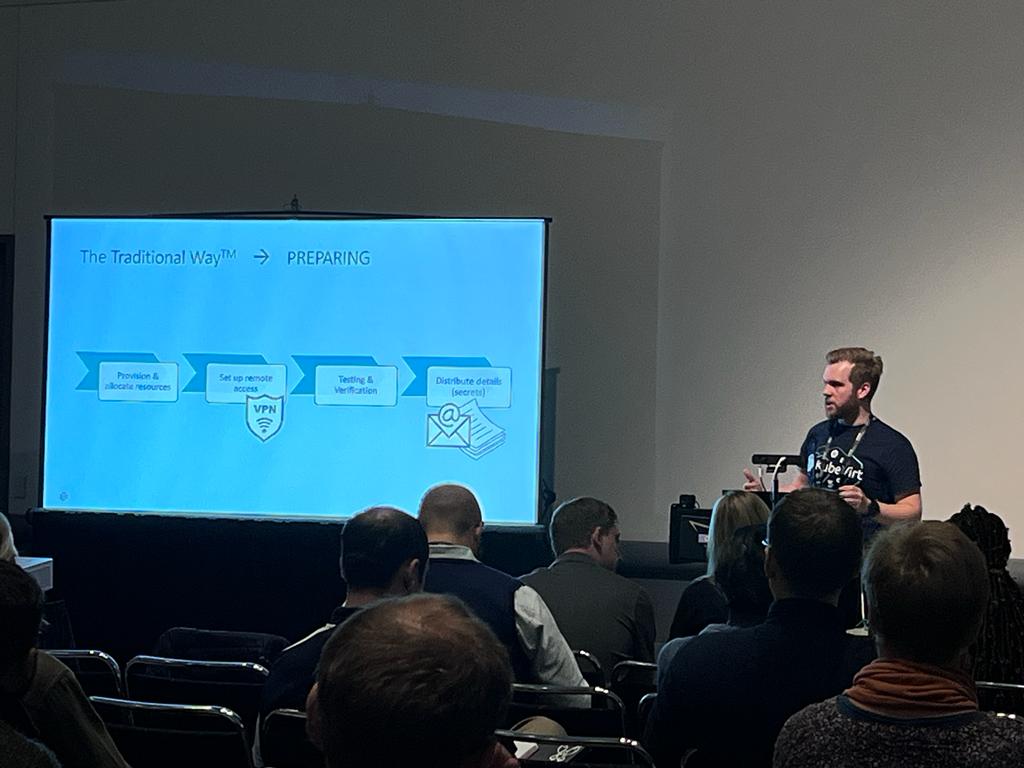
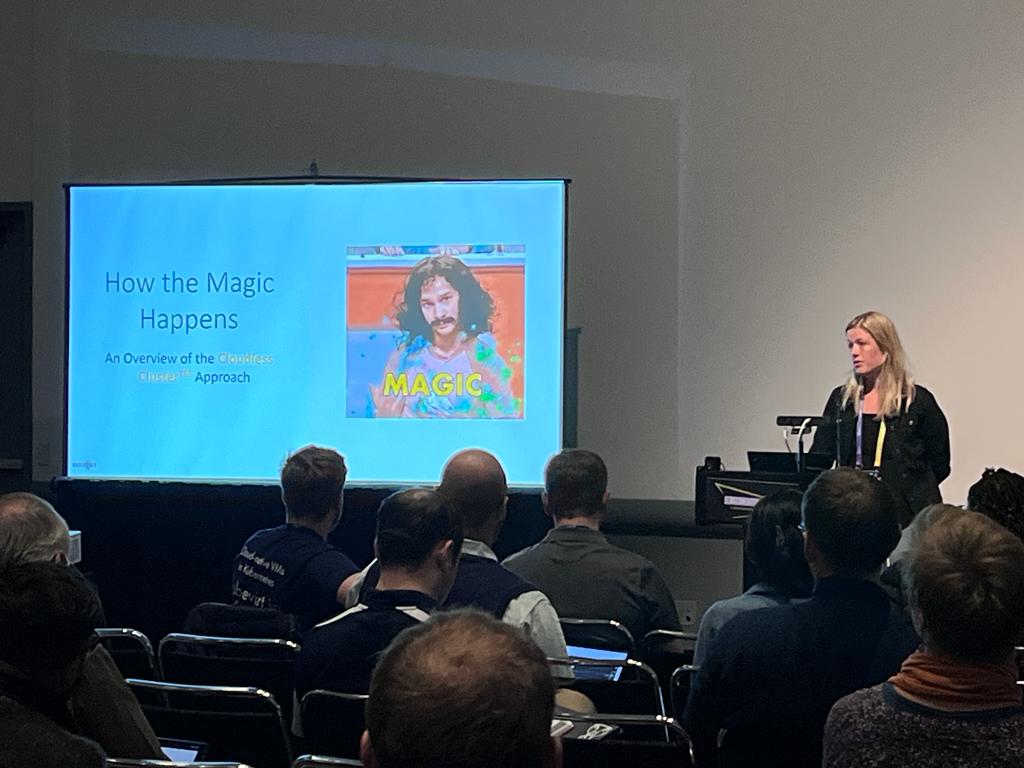
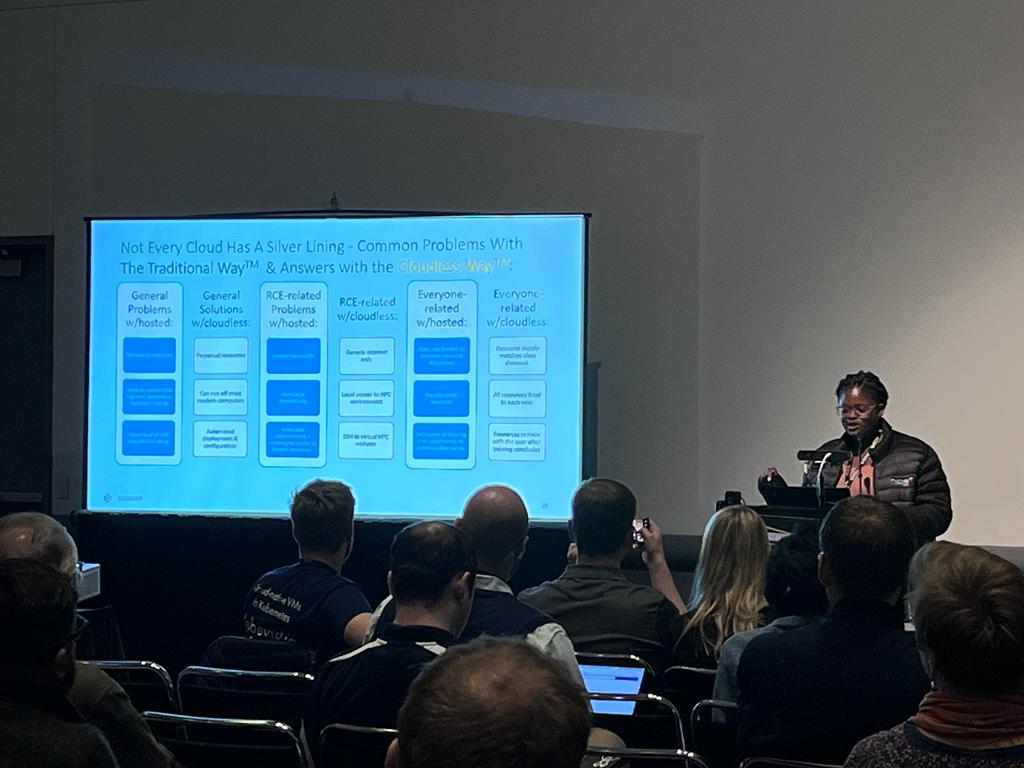
13 November 2023 – Workshops and Tutorials SC23
The workshops and tutorials continued on Monday. The workshop on Artificial Intelligence and Machine Learning for Scientific Applications (AI4S) was a favorite.
Animashree (Anima) Anandkumar did an excellent job presenting AI for short term and extreme weather forecasting downscaling and using machine learning on ERA5 datasets. This is not long term but rather six days ahead; she offered insight into possible ways to predict tipping points using conformal prediction with generative AI. This was particularly well aligned with my work in South Africa to establish a Renewable Energy Forecasting Hub – COLLABORATORS WELCOME!!
In amongst other workshops and tutorials, I couldn’t miss our very own HPC Ecosystems presentation on the best practices for HPC training and education. I was very proud of the team who did a great job in flying the flag high.

That evening, the exhibition hall was officially opened and for the first time the scale of the conference became clear to me. Privileged to be a part of it we spent the rest of the evening walking around the conference venue talking to various stall representatives understanding what they were offering.
As a group led by Bryan Johnston (CHPC), we had a booth at the HPC Illuminations pavilion, and the team was able to meet with SC23 General Chair Dorian Arnold (Emory University) and explain some of the work team SC23-Africa is doing in our respective parts of the world.
Throughout the evening, sponsors and tech company representatives gave out free merchandise to entice us to listen to their sales pitches. The scale of the conference was like nothing I have ever seen before, and it was wonderful to interact with so many people of like mind concentrated in one place. Needless to say, I went home with quite a haul for the evening.
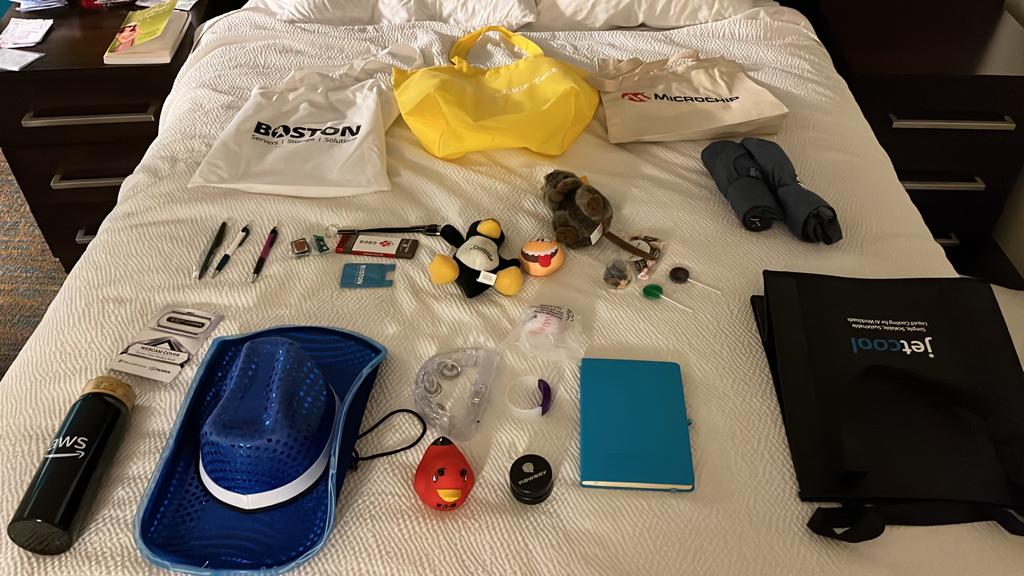
14 November 2023 – Day 1 SC23
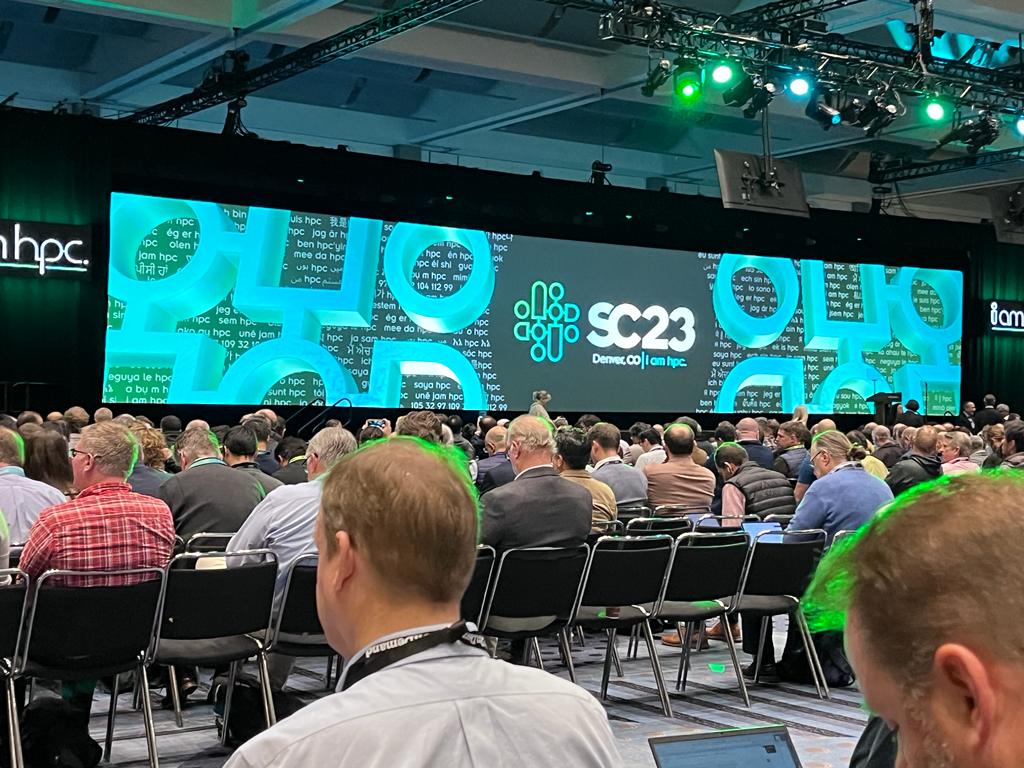
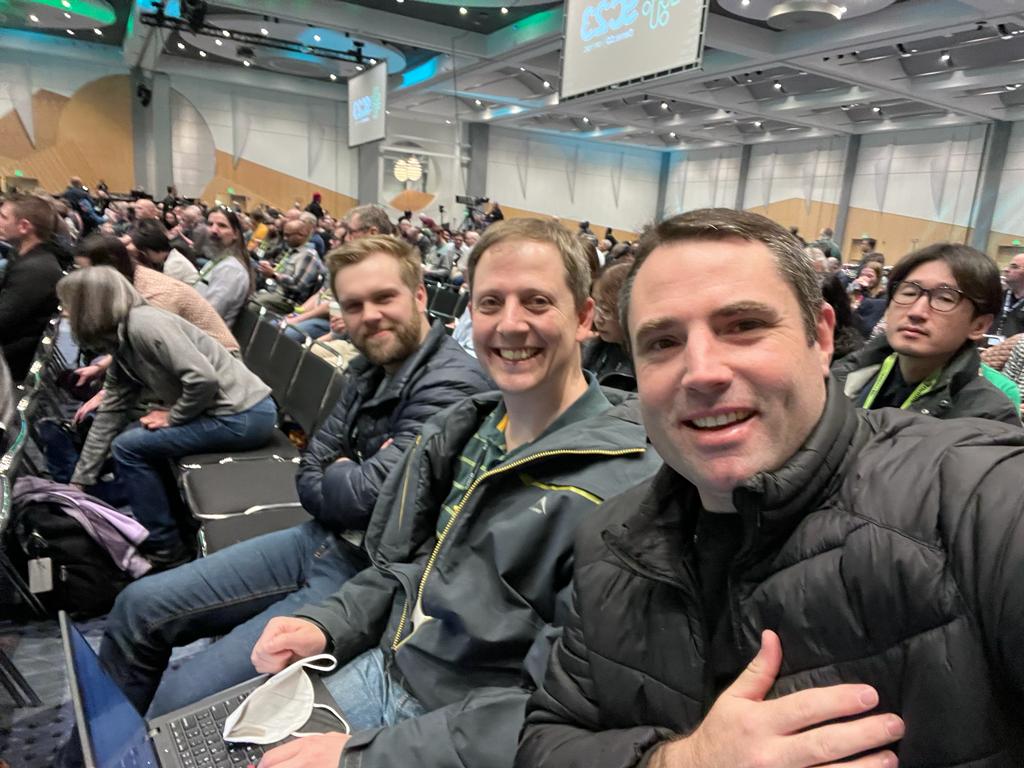
The day began with the SC23 Conference Keynote Speech which was led by Dr. Arnold,. It was inspirational and gave an excellent overview of the scope of HPC computing, globally. The conference was truly raising the bar from previous years and opening the world of supercomputing to a global audience. Following this, I was able to spend time viewing research posters with particular attention to the following which are directly related to my research:
- HPC Accelerated Generative Deep Learning Approaches for creating digital twins for climate models.
- NetCDFaster: A Geospatial Cyberinfrastructure for Multi-Dimensional Scientific Datasets Full-Stack I/O and Visualisation
- Towards enabling Digital Twins Capabilities for a cloud chamber
- Delivering Digital Skills across the Digital Divide
- A framework for energy efficient HPC system operation
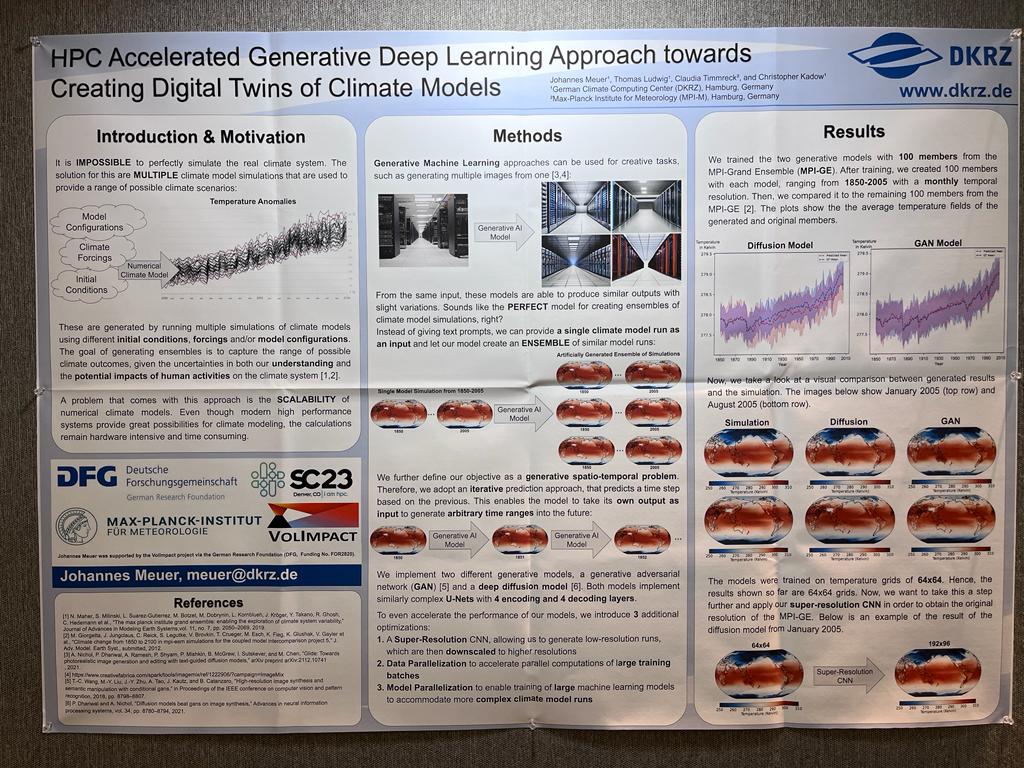
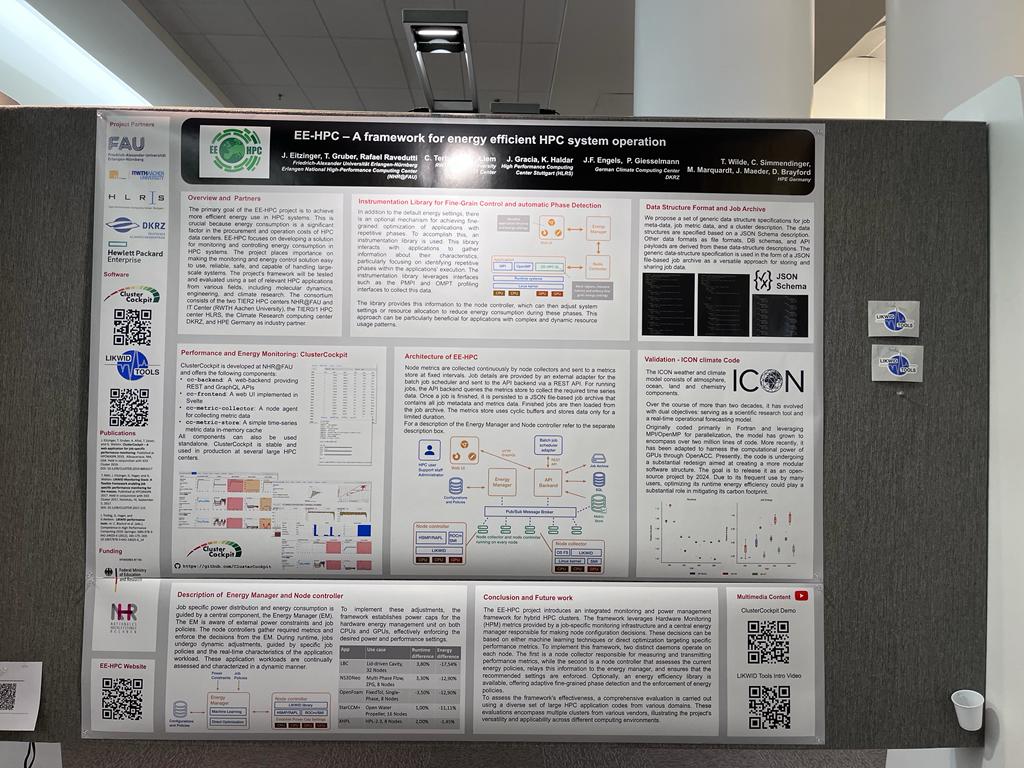
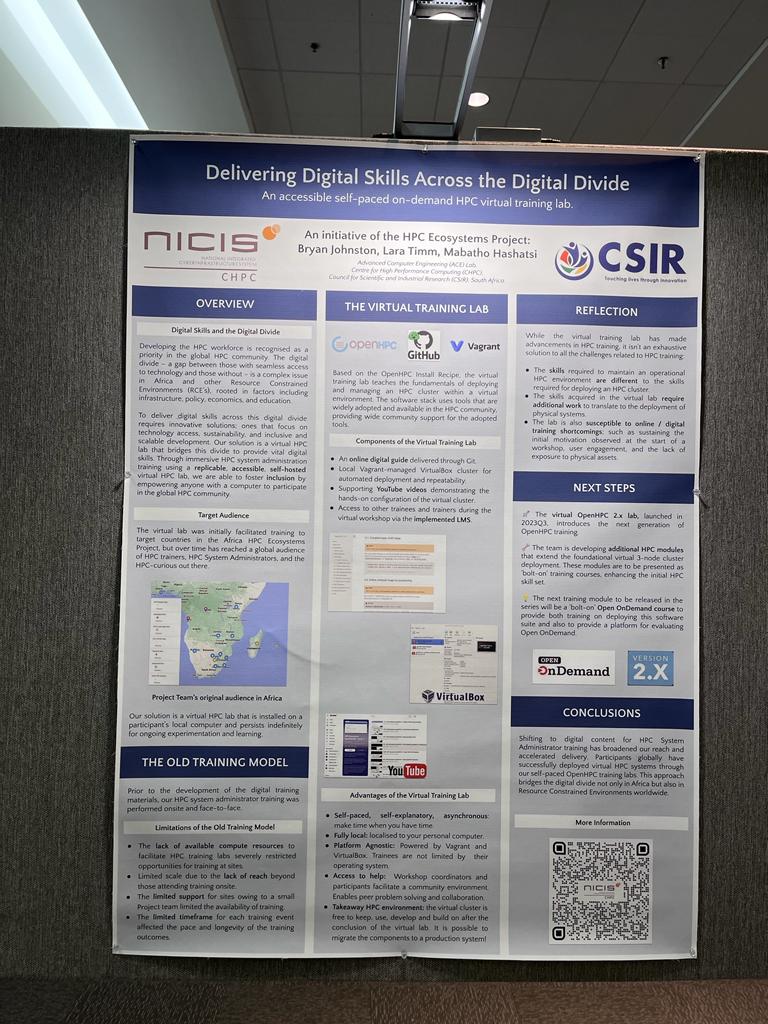
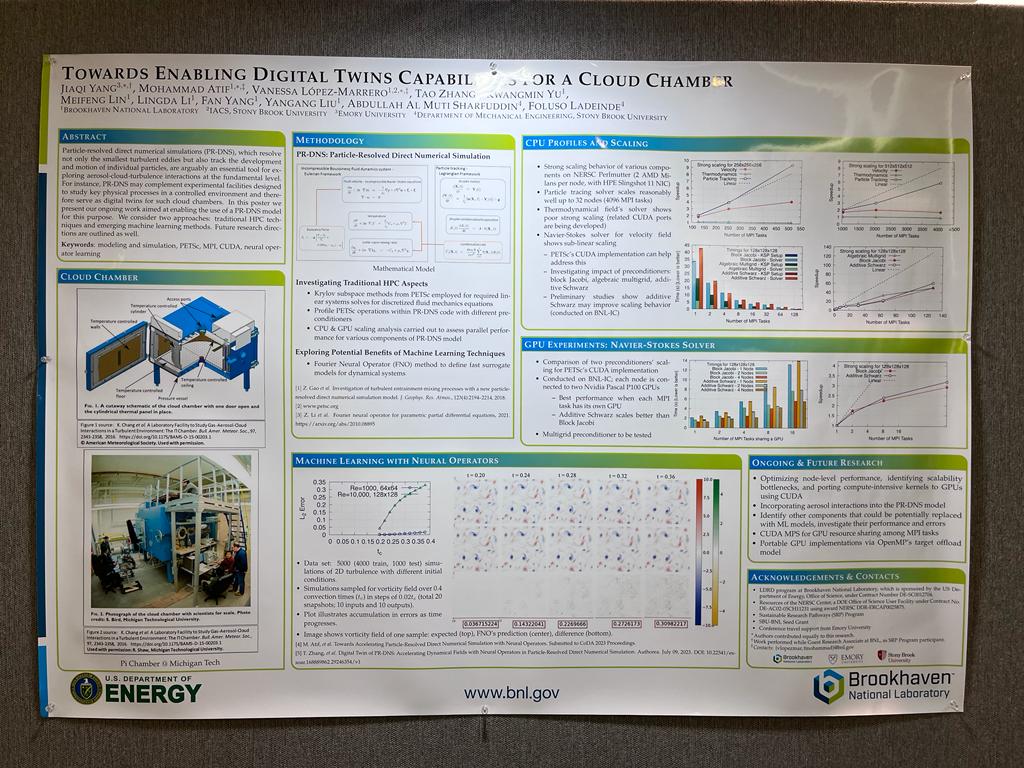
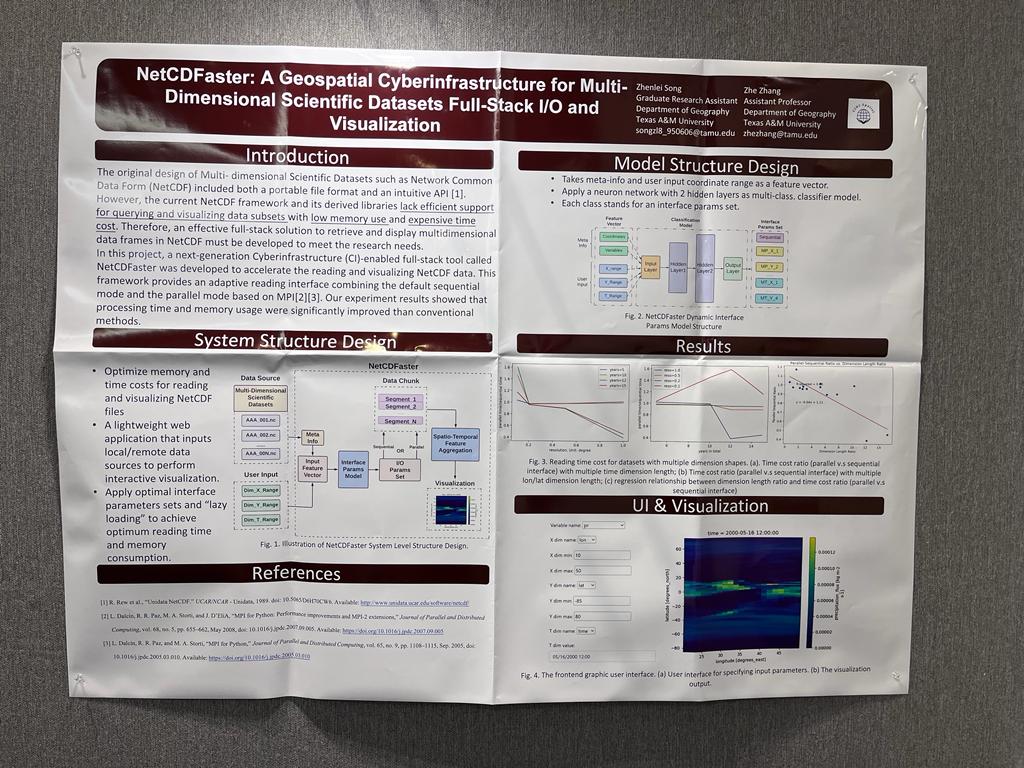
Digital twins came through as a strong theme and the hardware intensive nature of the computations required is very much aligned with the problems associated with my research – i.e. how to scale within the boundaries of available computational capabilities.
There were several visualisation showcases which were particularly intriguing, namely:
- Visualising the impact of the Asian Summer Monsoon on the Composition of the Upper Troposphere and Lower Stratosphere
- A Journey to the Centre of the Milky Way: Stellar Orbits around its Central Black Hole
- Visualising Megafires: How AI can be used to drive wildfire simulations with better predictive skills
- Exawind at NREL: Simulating the wake behind wind turbines in 3-D.
The Exawind project at NREL captured my attention, as this is generally the major loss in the design of wind farm layouts. By being able to visualize the wake pattern behind a wind turbine generator one can then improve the layout positioning of the downwind wind turbines and even test wake steering to avoid downwind turbines. This requires a huge amount of computing power, and the renewable industry won’t see this as mainstream for many years, but the research is encouraging!
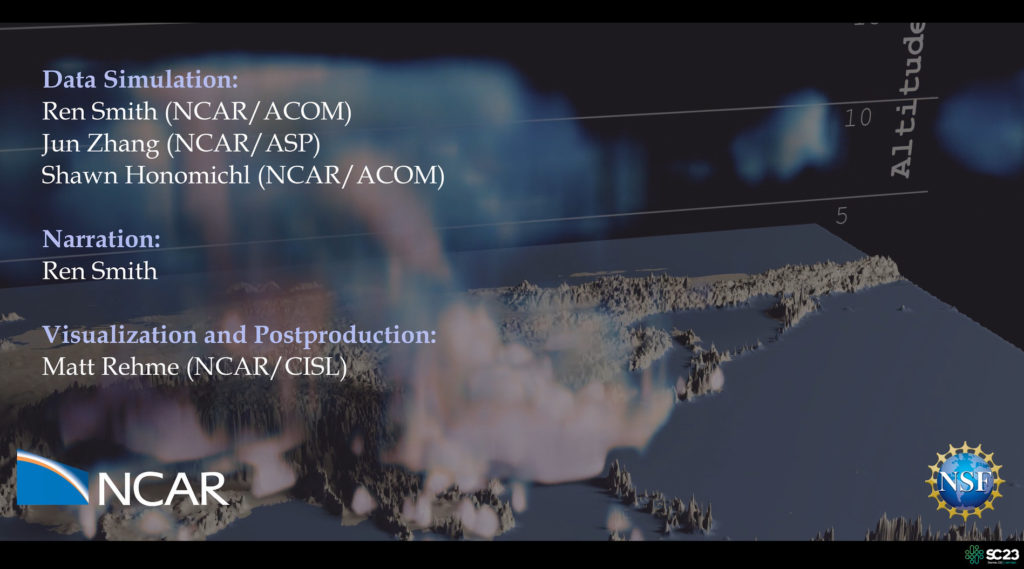
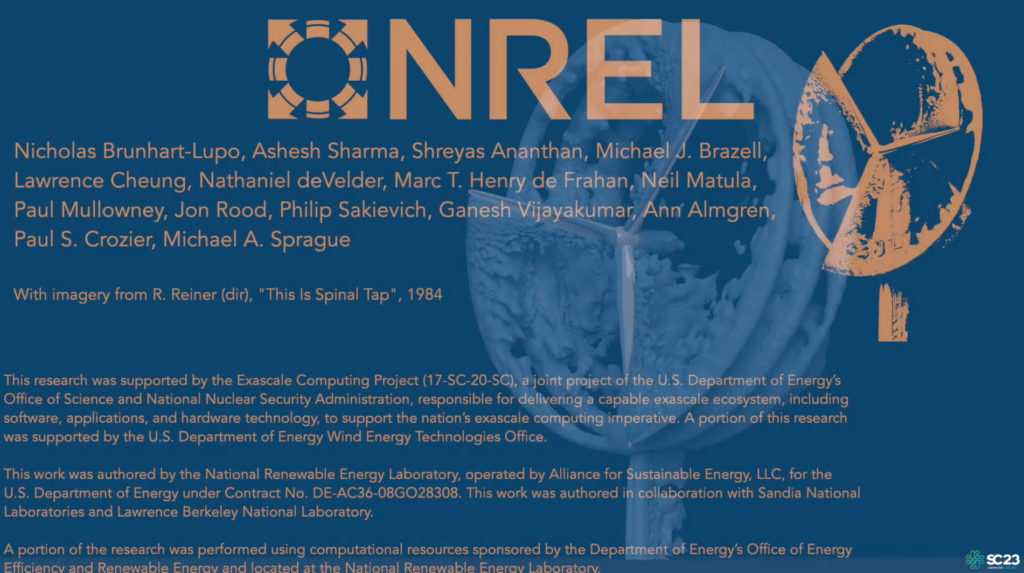
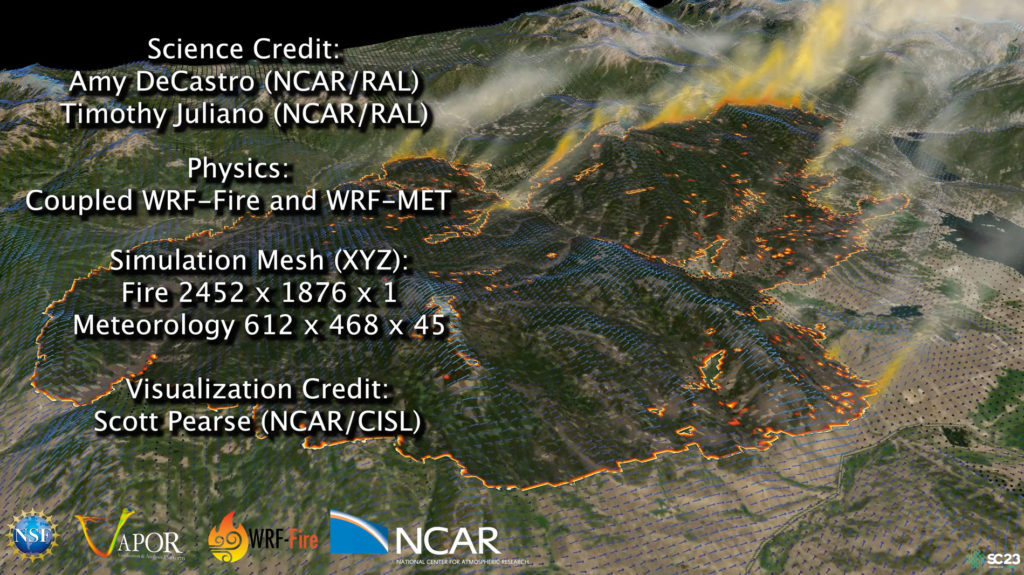
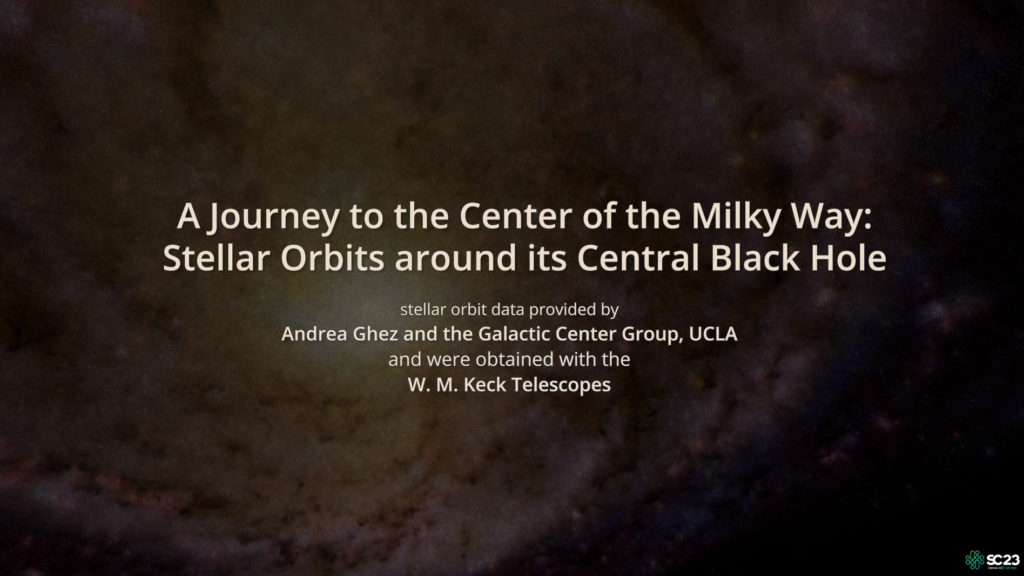
On a lighter note, during the proceedings, we were able to experience the world-famous Applebee’s for lunch. I made an Earth sandwich with my daughter who was back in South Africa, by each of us dropping a slice of bread at the same time. What fun!


15 November 2023 – Day 2 SC23
A highlight of the morning sessions was the ACM Gordon Bell Climate Finalists presentations, some of which – described above – were also showcased in the Data Visualisations booth outside the workshop rooms. Extremely interesting work using real time 30-second refresh weather forecasts. This could be extremely relevant for short-term variable renewable energy forecasting for system operations and load scheduling, intraday and day ahead.
I was surprised to see that my visit to the conference also raised some awareness within my home company. Scatec showcased it on our company social media site as below.
Unfortunately, it was time to head to Denver International airport to catch my flight back to South Africa. As I headed out over the snow-covered mountains, it dawned on me how lucky I was to participate in such a sought after gathering of minds.
To that end, it would be remiss of me not to send out a massive thank you to Elizabeth Leake of STEM-Trek for offering me this sponsorship opportunity to participate in NRG@SC23. It is truly appreciated and will have a long-lasting impact on my future career.
Furthermore, thank you Bryan Johnston (CHPC) for proposing my research as a contributor to NRG@SC23, which was greatly appreciated. Big thanks also to Dorian Arnold (below) for sponsoring the technical program registration (with workshops and tutorials) and to Google and additional sponsors for their contributions to STEM-Trek.
Farewell Denver and NRG@SC23, I look forward to future collaborations.
